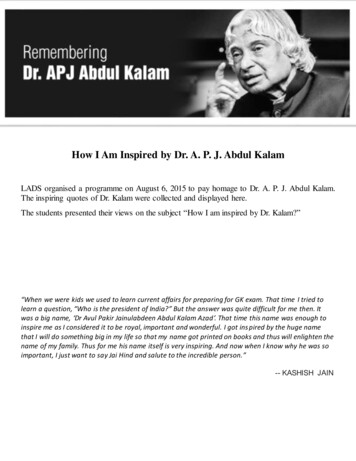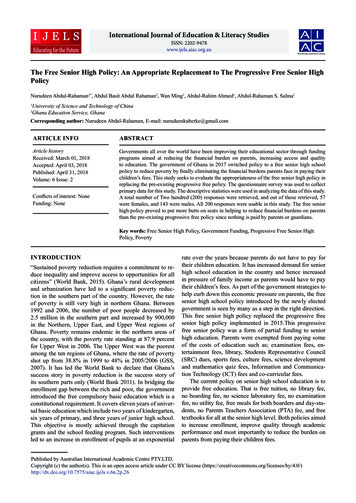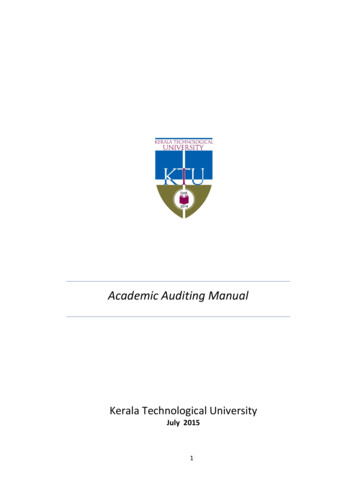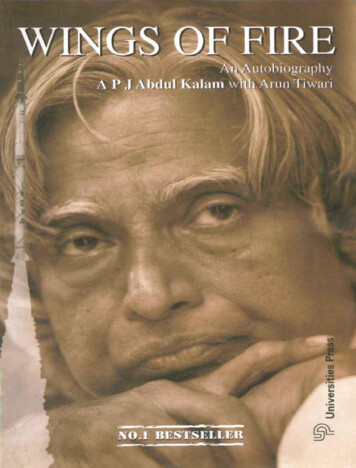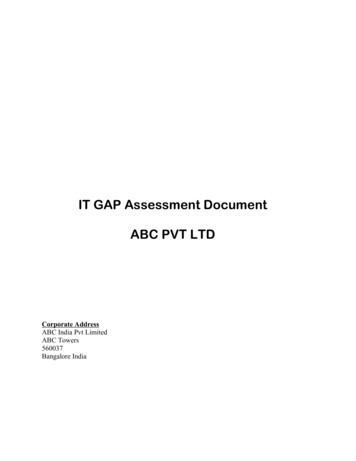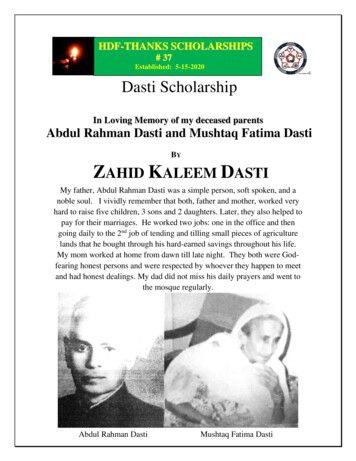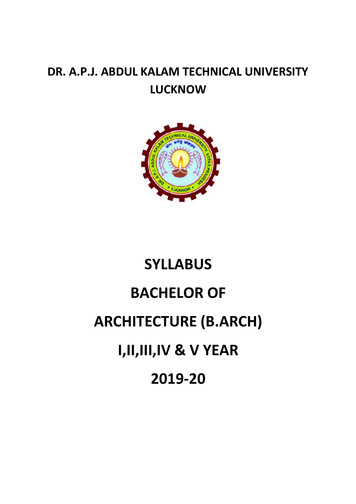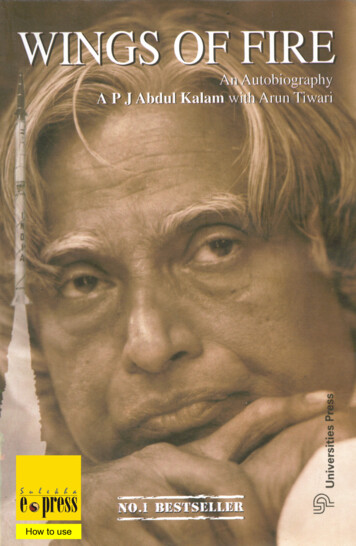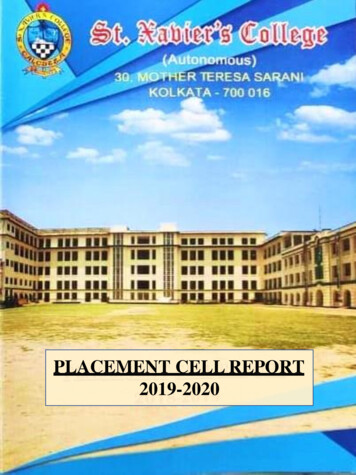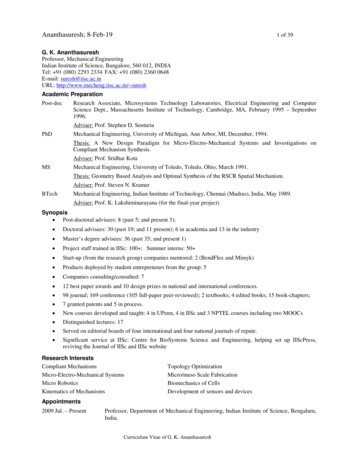
Transcription
"If we have to succeed in the globalized world, we have to enlargethe scope of Cost Audit to cover all aspects of manufacturingandservice sector activities including healthcare and education. "- APJ Abdul Kalam, Former President of IndiaThe Institute of Cost Accountants of India(Statutory body under an Act of Parliament)HeadquartersCMA Shawan, 12, Sudder Street, Kolkata - 700 016Telephone Nos: 91-33-2252-1031/34/35/1602/1492/1619/7373/7143Fax No. : 91-33-2252-7993/1026/2392/2871/2872Website: www.icmai.inDelhi OfficeCMA Shawan, 3, Institutional Area, Lodhi Road,New Delhi-11 0003.Phone No: 9111246 2-2156/2157/2158, Fax No.: 911143583642Hyderabad Centre of ExcellenceFinancial District, Plot No. 35, Survey No. 115/22 & 115/23, Nanakramguda Village,Serilingampally Mandai, Ranga Reddy District, Hyderabad - 500 032.Tel: 91-40-2300 2555, 91-40-2300 2557, Fax: 91-40-23002557E-mail: advstudies@icmai.in
ABOUT THE INSTITUTE:STUDENT FAQ’s- SYLLABUS 2016Q. 1. What does ICAI stand for ? What are its salient features ?Ans. ICAI stands for The Institute of Cost Accountants of India. Earlier known as The Institute of Costand Works Accountants of India was renamed as The Institute of Cost Accountants of India vide,The Cost and Works Accountants (Amendment) Act, 2011.It is : A premier professional body of Management Accountants in the country. A statutory body established on 28th May, 1959 under the Cost and Works Accountants Act,1959 as amended by the Cost and Works Accountants (Amendment) Act, 2006 and Cost andWorks Accountants (Amendment) Act, 2011. Under the administrative jurisdiction of Ministry of Corporate Affairs, Government of India. A member of the International Federation of Accountants (IFAC), The Confederation of Asianand Pacific Accountants (CAPA) and The South Asian Federation of Accountants (SAFA).The ICAI has – It’s Headquarters at Kolkata. 4 Regional offices at Kolkata, Mumbai, Chennai and New Delhi. 91 Chapters all over India. 9 Overseas centres More than 5 lac students and 70000 members(CMAs) serving in different capacitiesthroughout the world.Q. 2. What are the functions of the ICAI ?Ans. The functions of ICAI include Development and Regulation of the Cost and Management Accountancy profession inIndia. Conduct of Examinations for passing of Cost and Management Accountancy Course. Promote and develop the adoption of scientific methods in Cost and ManagementAccountancy. Develop the professional body of members and equip them fully to discharge theirfunctions in the area of Cost and Management. Exercise supervision over the entrants to the profession and to ensure strict adherenceto the best ethical standards by its members. Organize seminars and conferences on the subjects of professional interest in differentparts of the country. Carry out research activities covering various economic spheres and the publishing ofbooks and disseminating information of professional interest to help its members. Publication of highly reputed in house Professional Journal “The ManagementAccountant”. Regular interaction with the Government, Regulatory Authorities and Chambers ofCommerce & Industry. Issuance of Cost Accounting Standards. Issuance of Standards on Cost Auditing.ROLE OF CMAs :Q. 3. What is the role of Cost and Management Accountant (CMA) ?Directorate Of Studies, Institute of Cost Accountants of India(Statutory body under an Act of Parliament)Page 1
STUDENT FAQ’s- SYLLABUS 2016Ans. A Cost and Management Accountant specialises in navigating managerial decisions, stabilisingbudgets and standards, assessing operational efficiency and the effectiveness of production andservice management, identifying accountability for profit variance. His responsibilities include:designing and implementing effective management information and control systems, planningcosting systems and methods, inventory control incorporating mathematical models, investmentanalysis, project management, internal audit, cost audit, diagnosis in the case of sick industries, fundmanagement, pricing planning, interpreting information and data related to business activities andtranslating them in such a way as to guide the core management into taking the right decisions.CMAs are committed to: Enrich Cost Competiveness of Indian Industries. Create awareness and spread knowledge of Cost and Management Accountancy. Improve Cost and Management Accounting Literacy. Impart employable skills amongst Youth to serve the Society besides meeting Nationalrequirements. Contribute to green and Clean Technology. Participate in sustainable and inclusive growth and development of the Economy.CAREER PROSPECTS AS CMACMAsIN SERVICEINDUSTRYINPRACTICEACADEMIAQ. 4. What are the career prospects for Cost and Management Accountants both in employmentand in practice ?Ans. In this globalised world, organizations require professionals such as Cost Accountants (CMAs)who have specialized knowledge on business strategy and value creation. The Cost Accountant beingthe foundation on which the enterprises are built, the specialized education and training by theDirectorate Of Studies, Institute of Cost Accountants of India(Statutory body under an Act of Parliament)Page 2
STUDENT FAQ’s- SYLLABUS 2016Institute make the Cost Accountant a multi-faceted professional. CMAs are driving force in alleconomic activities, as they are the value creator, value enabler, value preserver and value reporter.Cost Accountants are in great demand in government sector, private sector, banking & financesector, developmental agencies, education, training & research sector as well as in service and publicutility sector. Further, in view of their specialized knowledge and training, CMAs may hold topmanagement position in public and private sectors’ enterprises like Chairman cum ManagingDirectors, Managing Director, Finance Director, Financial Controller, Chief Financial Officer, CostController, Marketing Manager and Chief Internal Auditor and other important positions.Those CMAs managing their own businesses have found themselves as a Manager and as anAccountant can control and thereby flourish their businesses. There is no doubt that a CostAccountant can attain the highest ladder of professional career.There is a sustained demand for qualified, trained and experienced cost accountants in India andabroad in different industries and Government Departments. Many members of the Institute arealso engaged in providing professional and cost consultancy services and in teaching cost andmanagement accountancy in Universities and Colleges.Cost accountancy edges over financial accounting. Cost accounting promotes study and adoption ofscientific methods to secure maximum efficiency in industrial, commercial and other spheres, ascompared to financial accounting. Financial accounting mainly draws conclusions on the basis ofpost facto data long after the operations are put through and expenditure were incurred enablingscore keeping or at best statistical analysis. Therefore, role of cost accountants go beyond a financialaccountant and they help the management in regulating production operations and processes ofproduction.The members of the Institute are the driving force in the team of management while in employment,and as Cost Auditors, Internal Auditors, Auditors in case of VAT, Excise, SEBI, NSDL and under otherstatutes/ Regulatory requirements, Advisors and Consultants in practice. There are several areas ofpractice available for Cost Accountants, a list of which is given below:INDEPENDENT PRACTICE: Cost Auditor , advising on Cost Records maintenanceSpecial Audit under Customs Act, Central Excise Act, Service Tax laws, VAT laws of variousstatesCertification under Central Excise, Customs, Service Tax, EXIM PolicySurveyor and Loss AssessorRecovery Consultant in Banking sectorAdvisor-Business Valuation, Financial servicesTrustee, Executor, Administrator, Arbitrator, Receiver, Appraiser, ValuerAssignments by the Central or State Government, Court of Law, Labour Tribunals or anyother statutory bodies, regulatory bodies etc.Stock Audit for banksInternal Audit and Concurrent AuditInsolvency professionals under Insolvency and Bankruptcy Code 2016CONSULTANCY SERVICES:Directorate Of Studies, Institute of Cost Accountants of India(Statutory body under an Act of Parliament)Page 3
STUDENT FAQ’s- SYLLABUS 2016Financial planning and Policy DeterminationCost Management Planning and PolicyCapital Structure Planning and PolicyWorking Capital ManagementProject Reports and Feasibility StudiesBudgeting and Budgetary controlSupply Chain ManagementInventory ManagementMarket Research and Demand StudiesValue AnalysisTCM, TQM, BPR, Cost Control and Value AnalysisControl Methods and Management Information and ReportingDesigning Staffing as per Business ProcessFraming Employee Benefit MeasuresManagement, Operational, Quality Environmental and Energy AuditsValuation in Business ReorganizationsStrategic Positioning, IntegrationSystem Analysis and DesignAdvisor on Funds ManagementCMAS IN EMPLOYMENT:As mentioned in the beginning, the Cost Accountants are most sought in the business world. Thereservices are deemed vital in investment planning, profit planning, project management and overallmanagerial decision making process. Many members of the Institute are occupying the top positionsin the organizations, as Chairman & Managing Director, Managing Director, Finance Director,Financial Controller, Chief Financial Officer (CFO), Cost Controller, Marketing Manager and ChiefInternal Auditor etc.Job Opportunities For CMAs include: Cost Accounting, Financial ManagementFinancial/Business Analyst, Systems Analysis & System ManagementAuditing, Internal ControlTax managementERP ImplementationProcess Analysis in BPO HousesImplementing Business Intelligence SystemsAcademia-as Faculties.CMAs are recruited by : Public Sector UndertakingsInfrastructure CompaniesPublic/Private Limited CompaniesManufacturing and Service IndustriesInsurance, Electricity, Banking CompaniesCMAS IN GOVERNMENT DEPARTMENT:Realizing the importance of the profession of the Cost and Management Accountancy in theDirectorate Of Studies, Institute of Cost Accountants of India(Statutory body under an Act of Parliament)Page 4
STUDENT FAQ’s- SYLLABUS 2016economic development of the nation, the Central Government has constituted an all-India cadreknown as Indian Cost Accounts Service (ICoAS) at par with other Class-I services such as IAS, IFS etc.to advise the government in cost pricing and in framing the appropriate fiscal and tax policies.CMAS IN EDUCATION:University Grants Commission (UGC) has notified “UGC Regulations on Minimum Qualifications forAppointment of Teachers and Other Academic Staff in Universities and Colleges and Measures forthe Maintenance of Standards in Higher Education, 2010 vide its Circular No. F.3-1/2009 dated 30thJune 2010.The Regulations prescribe the minimum qualification for appointment of teaching faculty inuniversities and colleges in the area of Management/ Business Administration. The qualificationsspecified for appointment of Assistant Professor, Associate Professor and Professor in the abovearea and Principal/Director/Head of the Institution include First Class Graduate and professionallyqualified Cost Accountant among other qualifications and subject to other requirements includingqualifying NET/SLET/SET as the minimum eligibility condition for recruitment and appointment ofAssistant Professors.FURTHER ACADEMIC PURSUITS: A member of the Institute can get enrolled as a member of IMA USA.Recognized by the Academic Councils of many Universities in India for the purpose ofadmission to the Ph.D. courses in Commerce. Various Universities have recognized CMAqualification for registration as M.Phil. and Ph.D. candidates in commerce and allieddisciplines.To extend the professional opportunities for CMAs the Institute has renewed the MoU withCIMA, UK on 31st January 2015 at Hyderabad under the revised terms and conditions, whichattaches wider recognition to CMAs, while pursuing CIMA,UK Course. CMAs under therevised terms would be appearing TOPCIMA and pursuant to clearance would be recognizedas CGMA (Certified Global Management Accountants) which is having a global recognition. The Institute of Cost Accountants of India (ICAI) and The Association of Chartered CertifiedAccountants (ACCA) of the UK signed a Memorandum of Understanding on February 20 atNew Delhi to work together towards co-operation in respect of professional training,education and examinations. Under the MOU, ACMA/FCMA can appear and qualify in 5(five) Papers at the Professional Level ( P1 to P3 -Essential/ Compulsory and P4 to P7 -anytwo papers which are Optional ). All 9 papers at Fundamental level are exempted. MOU between Indira Gandhi National Open University (IGNOU): As per MOU dated 11thJuly, 2008, IGNOU offers specialized B.Com and M.Com Programs for the students. TheStudents can simultaneously study the specialized B.Com (Financial & Cost Accounting)programme with the Institute’s Intermediate Course and specialized M.Com (ManagementAccounting & Financial Strategies) with the Institute’s Final Course.EMERGING AREAS FOR CMAS Total Quality Management (TQM), Statistical Quality Control(SQL)Enterprise Performance ManagementRisk Management-Project, Enterprise, Off Balance Sheet FinancingEnterprise GovernanceDirectorate Of Studies, Institute of Cost Accountants of India(Statutory body under an Act of Parliament)Page 5
STUDENT FAQ’s- SYLLABUS 2016Integrated ReportingSYLLABUS 2016: A JOURNEY TOWARDS SUCCESSQ5. What are the objectives of Syllabus 2016?Syllabus 2016 is designed to nurture young business leaders of tomorrow who can convert thedream of ‘MAKE IN INDIA’ into reality by taking strategic management decisions effectively in boththe National and International arena. The syllabus 2016 is based on International Standards set byIFAC (International Federation of Accountants) and IAESB (International Accounting EducationStandards Board) and Initial Professional Development - Professional Skills (Revised) through IEG(International Educational Guidelines): To create awareness and promote cost & management accounting education. To achieve six skill sets - knowledge, comprehension, application, analysis, synthesis andevaluation. Based on four knowledge pillars - management, strategy, regulatory function and financialreporting. To inculcate skills for employability. Increased emphasis on Accounting, Analysis, Reporting & Control, Strategy, PerformanceMeasurement, Analysis, Reporting, Corporate & Allied Laws, Taxation, Ethics andGovernance. To extend all possible professional expertise to ensure transparency and governance asdesired by the government.Q6. What are the subjects in Foundation/Intermediate/Final Course ?Ans. The subjects for Foundation Course are :Paper 1 Fundamentals of Economics and ManagementPaper 2 Fundamentals of AccountingPaper 3 Fundamentals of Laws and EthicsPaper 4 Fundamentals of Business Mathematics and StatisticsThe Intermediate Course consists of two Groups comprising of the following papers :Group - IPaper 5 Financial AccountingPaper 6 Laws & EthicsPaper 7 Direct TaxationPaper 8 Cost AccountingGroup - IIPaper 9 Operations Management & Strategic ManagementPaper 10 Cost & Management Accounting and Financial ManagementPaper 11 Indirect TaxationPaper 12 Company Accounts & AuditThe Final Course consists of two Groups comprising of the following papers :Group - IIIDirectorate Of Studies, Institute of Cost Accountants of India(Statutory body under an Act of Parliament)Page 6
STUDENT FAQ’s- SYLLABUS 2016Paper 13 Corporate Laws & CompliancePaper 14 Strategic Financial ManagementPaper 15 Strategic Cost Management-Decision MakingPaper 16 Direct Tax Laws and International TaxationGroup IVPaper 17 Corporate Financial ReportingPaper 18 Indirect Tax Laws & PracticePaper 19 Cost & Management AuditPaper 20 Strategic Performance Management and Business Valuation.For details visit http://icmai.in/upload/Students/Featured Links/CMASyllabus-2016.pdfFROM ADMISSION TO THE CMA COURSE UPTO MEMBERSHIP------------------WAY FORWARDQ. 7. What are the stages to be pursued to become a Cost and Management Accountant ?Ans. There are three stages to pursue Cost and Management Accountant course :1. Foundation Course2. Intermediate Course3. Final CourseFOUNDATION COURSE : FROM ADMISSION TO EXAMINATIONPassed ClassX/Equivalent-Eligible forAdmission inFoundationCoursePassed ClassXII/EquivalentEligible toAppear ination-Eligible totakeRegistration inIntermediateFor details please go through the prospectus.Directorate Of Studies, Institute of Cost Accountants of India(Statutory body under an Act of Parliament)Page 7
STUDENT FAQ’s- SYLLABUS 2016Admission is valid for 3 years from the date of admission to Foundation Course.INTERMEDIATE COURSE : FROM REGISTRATION TO EXAMINATIONQualified CMAFoundationExamination/*Enrollment forCoaching(Graduate in anydiscipline otherthan performingarts/ICSIFoundationExamination/Inter CAExamination/qualified CATCMA/EquivalentExaminationOral/Postal) Eligible toRegister toIntermediateCourse*CompleteCommunication& Soft Skill sTraining *Complete 100hours computertrainingEligible toAppear inIntermediateExamination(both groups)Registration Period :A registration is valid for a period of 7 (seven) years from the date of registration.FINAL COURSE : FROM ENROLLMENT TO EXAMINATIONQualify Intermediate Examination(both groups)Eligible to Enroll in Final Course*Enrollment for Coaching(Oral/Postal) *Complete "Industry Oriented Training Programme *Complete prescribed practical training/equivalentEligible to Appear in Final Course ExaminationDirectorate Of Studies, Institute of Cost Accountants of India(Statutory body under an Act of Parliament)Page 8
STUDENT FAQ’s- SYLLABUS 2016MEMBERSHIPQualify FinalExaminationComplete 15 DaysModular TrainingComplete 3 yearspracticaltraining/experienceApply and becomeMember of theInstituteFEE STRUCTUREQ. 8. What is the fee structure for joining the CMA course ?Ans. Fee Structure w.e.f. 01.02.2015 is l Fee ( )400020000*17000Computer fee(additional 50 hours for students migrating from syllabus 2002 )3400Modular Training after passing final examinationDENOVO FEERevalidation fee – Intermediate per Group40002000800Final per GroupComputer Training Exemption FeeSubject exemption Fee per paper100030001000Directorate Of Studies, Institute of Cost Accountants of India(Statutory body under an Act of Parliament)Page 9
STUDENT FAQ’s- SYLLABUS 2016Practical Training Exemption Fee2000*Installment facility available.Physically challenged students are entitled for waiver/refund of fees subject to production ofevidence in support of their disabilities. For details visit our website www.icmai.in Fees for studentsregistering from outside India, please refer to website www.icmai.in. There is also scheme to providefinancial assistance to economically challenged cum meritorious students. For details visit ourwebsite www.icmai.inQ 9. What is the nature of Installment facility?Ans:Installment facility for registration in Intermediate: 12,000/- (1st Installment)At the time of enrollment intointermediate course 8,000/- (2nd Installment)Payable on or before 31st January forJune term and 31st July for Decemberterm of examinations.Note:1. To be eligible for appearing in intermediate examinations, the 2nd installment amounting to 8000/- mustbe payable on or before 31st January for June term and 31st July for December term of examinations.2. If the student fails to pay 2nd installment within the prescribed time limit as mentioned in point no. 1, theinstallment facility will be still available till next 3 Consecutive terms. The 2nd installment is to be paidwithin the cut-off dates (on or before 31st January for June term and 31st July for December term ofexaminations).3. No student can appear for Intermediate examination without paying 2nd Installment.4. Failure to pay the 2nd installment within the prescribed time limits as mentioned in point no 1 & 2, will leadto forfeiture of the amount already paid as 1st installment.5. After paying 1st installment student will get study materials of both groups and can opt for oral/postalcoaching of either group ( Group I/II) as per the choice of the student.6. After paying 2nd Installment student will be eligible to opt for oral/postal coaching of other group andcomputer and other training as applicable.ADMISSION/REGISTRATION/ENROLLMENT PROCESSQ. 10. What are the cut off dates for admission to Cost and Management Accountant Course ?Ans. Admission/Registration for the CMA course is open throughout the year However, Studentsdesirous to appear for June Term Examination should apply that year and for December TermExamination should apply before 31st July of that year before 31st January of that year.Directorate Of Studies, Institute of Cost Accountants of India(Statutory body under an Act of Parliament)Page 10
STUDENT FAQ’s- SYLLABUS 2016Q11. How do I take admission in Foundation /Registration in Intermediate/Enrollment in Final?Ans: You may take admission/registration/enrolment both Online and Offline.Fee PaymentOffline Payment andOffline RegistrationOnline Payment andOnline RegistrationPay throughPNB/IDBI/CBI Challan.For payfee Challan viststudent section ofwebsiteApproachRC/CHapter/CMASC tocomplete process ofRegistrationFor online AdmissionFollow link https://cmaicmai.in/students/Home.aspxFor Offline AdmissionLink for Payfee Challan http://icmai.in/studentswebsite/admission challan.phpLink for Admission FormsAdmission Forms Form S1 - Enrolment Form for Foundation Form S2 - Registration Form for Intermediate Form S3 - Enrolment Form for FinalDirectorate Of Studies, Institute of Cost Accountants of India(Statutory body under an Act of Parliament)Page 11
STUDENT FAQ’s- SYLLABUS 2016TRAINING REQUIRMENTSQ.12. What are the training required to be undertaken by the students pursuing CMA course ?Ans. The students are required to undergo the following training:I. 3 days “Communication and Soft Skills” for Intermediate studentsII. Compulsory Computer Training for Intermediate students for 100 hoursIII. 7 days “Industry Oriented Training Programme” after enrolling for Final course.IV. 15 days Modular Training after passing Final course and before campus.V. Practical training, as provided in regulations.Q.13. What is Compulsory Computer Training Programme ?Ans. 100 hours of Computer Training is required for appearing in both or remaining group ofIntermediate course.Exemption from Computer Training : A student having passed Bachelor of Engineering or Post Graduation in Computer Science orComputer Application or MBA (Systems) or PGDCA or MCA from Indian Institute ofManagement or a recognized University or an Institute recognized by All India Council forTechnical Education or Department of Information Technology [formerly Department ofElectronics (DOE)], Government of India, ‘A’ level Certificate Course of National Institute ofElectronics and Information Technology (formerly DOEACC) may be exempted fromCompulsory Computer Training. Students/Members of the Institute of Company Secretaries of India (ICSI) having completedthe required IT training of ICSI would be exempted from under going the prescribed hours ofcomputer training of the Institute of Cost Accountants of India subject to production ofevidence of completion of training from ICSI. CIMA/ACCA members are also eligible for exemption from Computer Training.Q. 14. What is the last date for Completion of Computer Training ?Ans. A student appearing for the remaining group/both groups of the Intermediate Examination hasto complete Computer Training before filling up the form for Intermediate Examination.Q.15.What is Communication and Soft skill Training?Ans: 3 days Communication and soft skill Training is required for appearing in both or remaininggroup of Intermediate course.Exemption from CSS Training.Exemption will be granted from undergoing "Communication and Soft Skills Training" for workingExecutives and holding qualifications as specified hereunder undergoingDirectorate Of Studies, Institute of Cost Accountants of India(Statutory body under an Act of Parliament)Page 12
STUDENT FAQ’s- SYLLABUS 2016CMA Intermediate Courses of the Institute on the basis of the followingparameters:(a) Holding Masters Degree ( other than in performing art) or Graduate Engineers or passed finalistsfrom the Institute of Company Secretaries of India or passed finalists from the Institute of CharteredAccountants of India or Actuaries or Registered Valuers, Law Graduates (by whatever name called ,and(b ) Having a work experience of not less than 3-years in any Government or Public or Private Sectorsor Universities or Colleges or Academic Institutions (recognized by AICTE/UGC) or holding aCertificate of Practice of Institute of Company Secretaries of India or Institute of CharteredAccountants of India or as an Engineer of any discipline, Valuer, Actuary or LegalPractitioners/AdvocatesFor online application aspx?ReturnUrl %2fstudentfacility%2fSUBJECT EXEMPTIONS:Q.16. . What are exemptions available to the students ?Ans. On the basis of examination :If a candidate is unsuccessful in passing a group but secures 60% or more in any paper or papers, heshall be exempted in that paper(s) from appearing in the immediately successive three terms ofexamination.On the basis of qualification:Ans: Syllabus 2016 exemptions based on qualification are in process of finalisation.Q. 17. What are the exemptions available under Syllabus 2016 for students under 2012 syllabus ?INTERMEDIATE:(1)Students who are presently pursuing Intermediate Course under Syllabus 2012, having qualifiedeither of the Groups in Intermediate Course under Syllabus 2012, upon switch-over to Syllabus 2016shall be granted Exemptions as under:Group-wise Exemption :Under Syllabus 2016Under Syllabus 2012Exempted fromDirectorate Of Studies, Institute of Cost Accountants of India(Statutory body under an Act of Parliament)To complete Intermediate Course, shallhave to appear and qualify inPage 13
Qualified Group I of theIntermediate CourseSTUDENT FAQ’s- SYLLABUS 2016Qualified Group II of theIntermediate CourseExempted from appearing in Group I ofGroup II of the Intermediate Coursethe Intermediate CourseExempted from appearing in Group IIof the Intermediate CourseGroup I of the Intermediate Course(2)Students who are presently pursuing Intermediate Course under Syllabus 2012, having passedSubject(s) under Syllabus 2012, upon opting to switch-over to Syllabus 2016, and if otherwise eligibleas per rules of the Institute, can now avail exemption for the immediate next three terms in thefollowing Subject(s):Paper-wise ExemptionSecured/obtained atExempted from appearing in theleast 60% marks in anycorresponding/equivalentValidity period for availing the benefit of exemptionsubject under “Syllabussubject under “Syllabus 2016”2012”Paper 5 – FinancialAccounting of Group IUntil the completion of three consecutive termsfrom the end of the term in which such qualifyingmarks was secured/obtained by the said student.Paper 6 – Laws, EthicsPaper 6 – Law &, Ethics of Group Example:and Governance ofIa. If the student has obtained 60% marks inGroup IPaper 5- Financial Accounting under SyllabusPaper 7 – – DirectPaper 7 – Direct Taxation of2012 in June 2016 examination.Taxation of Group IGroup Ib. Subsequently, the said student appeared inPaper 8 – – CostDecember 2016 examination, but failed toAccounting & Financial Paper 8 – Cost Accounting ofcomplete/qualify Group I under SyllabusManagement of Group Group I2012.Ic. The said student now opts for pursuing thePaper 9 – OperationsPaper 9 – OperationsCourse under Syllabus 2016. In such a case,Management &Management & Informationthe validity period for allowing thisInformation Systems ofSystem of Group IIexemption shall remain valid untilGroup IIDecember 2017.Paper 10 –Cost andManagementAccountancy of GroupIIPaper 5 – Financial Accountingof Group Id. Assuming the student fails to clear/qualifyGroup I under Syllabus 2012, even inDecember 2017, then he/she shall have toappear in Paper 5- Financial Accountingunder Syllabus 2016, as the validity of threeconsecutive terms has expired in December2017.Paper 10 –Cost & ManagementAccounting and FinancialManagement of Group II[ Here, 3 consecutive terms are – December 2016,June 2017, December 2017]Paper 11-– IndirectPaper 11- Indirect Taxation ofDirectorate Of Studies, Institute of Cost Accountants of India(Statutory body under an Act of Parliament)Page 14
Taxation of Group IISTUDENT FAQ’s- SYLLABUS 2016Paper 12- CompanyAccounts and Audit ofGroup IIGroup IIPaper 12- Company Accountsand Audit of Group IINote: (i) If any student obtains qualifying marks under Syllabus 2012 in the last term of that Syllabus 2012, i.e.December 2017, then the benefit of availing the exemption shall continue under Syllabus 2012 for the next threeconsecutive terms, i.e. June 2018, December 2018 and June 2019.(ii) Dual benefit of passing a group and earning exemption in paper cannot be availed.FINAL :(3)Students who are presently pursuing Final Course under Syllabus 2012, having qualified either ofthe Groups in Final Course under Syllabus 2012, upon switch-over to Syllabus 2012 shall be grantedExemptions as under:Group-wise Exemption :Under Syllabus 2016Under Syllabus 2012Exempted fromTo be declared as Final Complete Pass, shallhave to appear and qualify inQualified Group III of theFinal CourseExempted from appearing in GroupIII of the Final CourseGroup IV of the Final CourseQualified in Group IV ofthe Final CourseExempted from appearing in GroupIV of the Final CourseGroup III of
CIMA, UK on 31st January 2015 at Hyderabad under the revised terms and conditions, which attaches wider recognition to CMAs, while pursuing CIMA,UK Course. CMAs under the revised terms would be appearing TOPCIMA and pursuant to clearance would be recognized as CGMA (Certified Global Management Accountants) which is having a global recognition.
